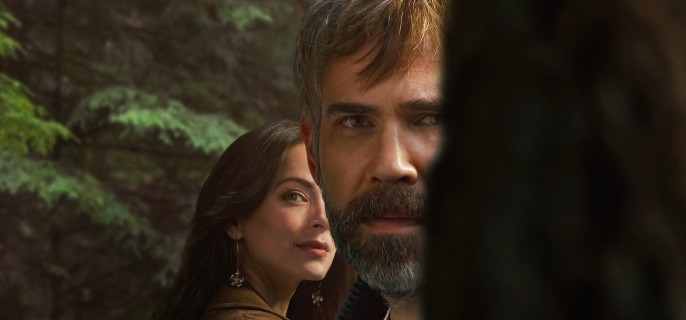Each week, I indulge in a jest about the threshold of murders a small town can bear before they cease to be noteworthy. Hence, I feel a sense of vindication with "Strangers Among Us," the inaugural episode of Murder in a Small Town Season 2, that delves deeper into the essence of small-town life and forgoes the typical murder plot. Coincidentally, this episode stands as the finest so far, boasting an intimacy-tinged atmosphere, emotional complexity, and thematic relevance that Karl has ever been tasked with addressing. The revelation that less violence can yield more impact is astounding.

While some typical hiccups persist—Karl and Cassandra's relationship confined to fleeting scenes, their storylines seemingly disconnected—a subtle interconnectedness begins to emerge. Issues such as underfunding in Karl's department, the ripple effects of small-town policing, the overly intricate social hierarchies in high school and beyond, and the systemic indifference characterizing places like Gibsons all feel more intertwined. Although the main cases of the week involve complete strangers, including a notable cameo by Tyler Posey from Teen Wolf as Ryan Coogan, the central narrative remains compelling.
Posey's character, Ryan, arrives in town to visit his friend Jack Coutts, who becomes the victim of an almost-murderous incident. It's revealed that Ryan shot Coutts during a heated argument about Ryan's involvement in Jack's daughter's death years ago. While Ryan's intentions were not to kill his friend, self-preservation drives him to lurk around the hospital, hoping to finish the job before Jack wakes up and reveals the truth. Despite it being an accident and Ryan's reluctance to harm his friend, he's caught before he can smother Jack with a hospital pillow.
While Posey's cameo garners much attention, what truly fascinates is the side story involving Elliot, a young boy bounced around the foster system his entire life and subjected to relentless bullying at school. As he stumbles upon Jack on the roadside before his hospitalization, he also discovers a gun next to him, which he ill-advisedly decides to keep and take to school. Elliot's impulsive decision doesn't merely endanger himself but also influences his 13-year-old foster brother Greg, who is more inclined to defend both himself and Elliot than Elliot seems to be.
The disaster looms on the horizon as Greg steals the gun, follows Elliot's bully home, and tries to scare him with it. This leads to a standoff that terrifies everyone, especially the cops led by Sid and Laila who must respond and de-escalate the situation safely. The execution of this sequence is both chilling and compelling, demonstrating how one impulsive decision can set off a chain reaction of consequences that reverberate through the community.
In the gripping narrative of "Murder in a Small Town" Season 2, Episode 5, it is not the actual act of murder that drives the plot forward but rather the ominous looming threat of death or its mere specter, as Cassandra finds herself immersed in the whirlwind. An unanticipated invitation from the mayor to attend a gathering of the Gibsons Safety Society to address the precarious railings in dangerous areas serves as a cryptic lead, teasing her with clues about Lauren Park, whose long-ago death and roadside memorial were first introduced in the third episode.
Fortuitously, this invitation also provides a means to keep Holly, Karl's daughter, entangled in the intrigue, as she delves into a project centered on roadside memorials. The presence of enchanter's nightshade, a plant notoriously associated with revenge due to its genus name, Circaea, derived from Circe, the enchantress from Homer's Odyssey who transformed Odysseus's men into pigs for their disrespectful behavior, raises several red flags. It is an unusual flower to leave at memorials for what were supposedly accidents, especially 25 years apart. There's clearly a case here, one weaving its way through the annals of Gibsons in a manner that Karl's murder-filled episodes often fail to achieve. The journey ahead promises to be captivating.
Cassandra might as well keep herself occupied, for at present, Karl seems preoccupied with other matters. Their moments of togetherness are few and far between, culminating in a light-hearted bickering session about Cassandra hanging one of Karl's private paintings (he's so moody; I don't know how she puts up with him). They've reached the "I love you" stage of their relationship, which is heartening, but something tells me it may not be destined to last.

